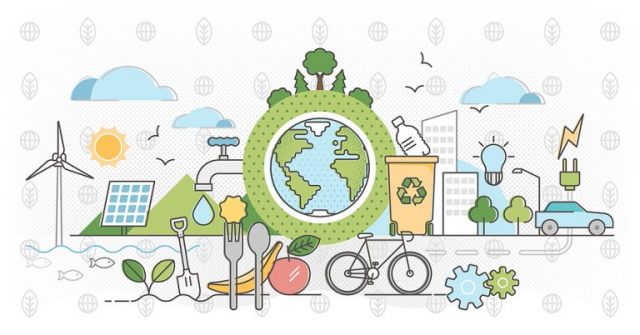I support environmental causes. I believe that some aspects of the frugal lifestyle are inherently good for the environment, but others can be wasteful. I shop at the farmer’s market and buy grass-fed beefc. But, I don’t pay more for most products labeled as being. There are, of course, exceptions. Products with really big price tags like energy-efficient windows and hybrid cars cost more to make and have a proven effect (they also may save you money in the long-run.) But “green” clothes and “green” cleaning products? No way. Here are ten products where being green doesn’t make it worth paying extra.
Anything Labeled “Natural”
Okay, this isn’t one specific product. Lately, manufacturers have gotten really loose with the “natural” label. They’ll slap that on the package, put on some green pictures, and then raise the price. But “natural” isn’t a regulated term. High-fructose corn syrup advertises itself as natural, and so do many canned products. Take a gander at the label instead. Are there any ingredients you don’t recognize? Does it contain “natural flavors”? Then it’s not all that natural. An apple is natural. A jar of artificially-sweetened applesauce isn’t.
Green Cleaning Products
It’s true that some major household products companies are producing more environmentally-sound products (hello Clorox Greenworks products), but they come with a higher price tag. Some companies then apply their “greener” chemicals to disposable cleaning wipes, which sort of defeats the purpose. And costs more. If you really want to clean green without the extra marketing costs built right in, first try Trader Joe’s, which has had green products for a while, and they’ve always been cheaper (although they’re not as effective in older, less-efficient dishwashers.) Or, go homemade. There’s nothing more natural than a lemon when it comes to cleaning.
Green Clothing
Eco-dyes, bamboo fabrics, recycled materials. Yes, it’s theoretically good for the environment, but is it worth the extra cost? At this point, I’m not ready to spend $60 for an environmentally-friendly T-shirt, especially if the bamboo isn’t organically grown and might actually be rayon! And those cheap shirts that claim to be made with organic cotton? What about the rest of the chemicals in them? Sorry, I’m not buying it.
Recycled Diapers
It’s great that diaper manufacturers want to do their part to make diapers more eco-friendly, but diapers are still going to wind up in a landfill. Rather than buying disposables, opt for cloth diapers. Once the kid is potty-trained, the diapers become cleaning rags. Call it upcycling at its finest. Yes, you have to wash them and that consumes energy, but it’s still cheaper and more ecologically sound than a mountain of plastic diapers.
Organic Feminine Hygiene Products
There’s no bandwagon feminine hygiene products won’t jump on. Organic is just the latest. But an organic all-cotton hygiene product still winds up in the trash along with the old-school regular cotton one. So go one better and get a Diva Cup. No more trash at all, and it’s only $30 for ten years of use. Beat that, Tampax!
Biodegradable Paper Plates and Plastic Utensils
Even disposable products like paper plates are getting into the green thing, by claiming to be biodegradable, except we all know that things don’t really break down in the trash. Plastic utensils claim to be made from recycled materials. Where do they wind up? The trash. Instead, use real plates and utensils.
Non-Hybrid Cars
If you saw the Superbowl, you probably saw the ad for the “greener” Audi A3 TDI. What does this amazing green car run on? Diesel. While Diesel isn’t quite as bad as it used to be, and diesel vehicles do get better gas mileage than traditional cars, it’s still a gas-powered car and it has a $28,000 price tag (plus the higher cost of diesel in the US). True, it gets 34 miles to the gallon, but that’s far less than a Toyota Prius or Honda Civic Hybrid.
Bottled Water
Bottled water manufacturers are touting their reduced packaging and commitment to the earth, but they’re still bottling water. Unless you’re traveling somewhere the water is unfit to drink, use a reusable glass and tap water (or filtered water). Going on a roadtrip? Fill your reusable bottle from the tap, and pack a thermos or two.
Recycled Paper Towels
They can make them out of recycled fibers, they can use natural dyes, they can do whatever they want, paper towels are fundamentally ungreen. (So is toilet paper, but I have to draw a line somewhere.) Instead, use towels. We’ve nearly eliminated paper towels in our house. I believe our current roll has been on the counter for over a month and we’ve used half of it. Pretty much the only time I use a paper towel at home is to pat dry raw chicken because I haven’t come up with a place to store wet, potentially-contaminated towels and I don’t want to run the washing machine for one towel.
Green Cosmetics
Some makeup claims to be environmentally friendly because it uses less chemicals, but it’s still usually comes in plastic packaging that is meant to be disposable. Sometimes they claim it’s green because it’s powder minerals, but those same minerals are found in most pressed powder products. So why pay more for something that’s pretty much the same? If you want a mineral makeup because you like the way it feels, go for it, but don’t do it to be green.
